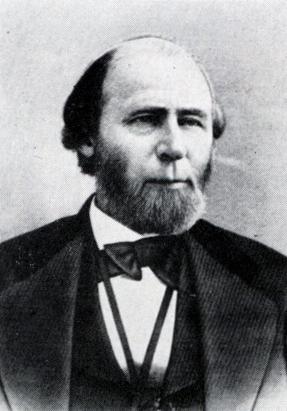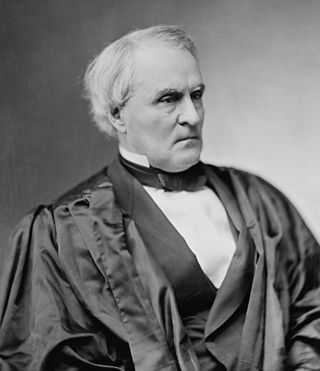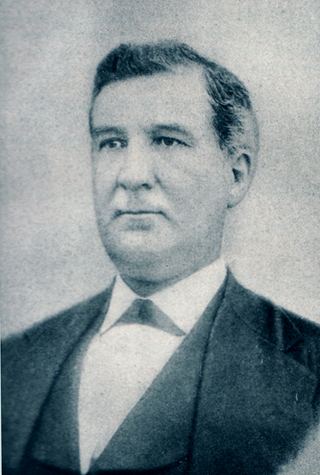Related Research Articles

William Woods Holden was an American politician who served as the 38th and 40th governor of North Carolina. He was appointed by President Andrew Johnson in 1865 for a brief term and then elected in 1868. He served until 1871 and was the leader of the state's Republican Party during the Reconstruction Era.

William Strong was an American lawyer, jurist, and politician who served as an Associate Justice of the Supreme Court of the United States from 1870 to 1880. Strong previously served as a U.S. Representative from Pennsylvania from 1847 to 1851 and as a justice of the Supreme Court of Pennsylvania from 1857 to 1868. He also served on the Commission that adjudicated the disputed presidential election of 1876.

The 1868–69 United States House of Representatives elections were held on various dates in various states between June 1, 1868, and August 2, 1869. Each state set its own date for its elections to the House of Representatives before or after the first session of the 41st United States Congress convened on March 4, 1869. They coincided with the 1868 United States presidential election, which was won by Ulysses S. Grant. Elections were held for all 243 seats, representing 37 states. All of the former Confederate states were represented in Congress for the first time since they seceded from the Union.

Robert Brown Elliott was a British-born American politician of British Afro-Caribbean ethnic background. He was a member of the United States House of Representatives from South Carolina, serving from 1871 to 1874.

Josiah Thomas Walls was a United States congressman who served three terms in the U.S. Congress between 1871 and 1876. He was one of the first African Americans in the United States Congress elected during the Reconstruction Era, and the first black person to be elected to Congress from Florida. He also served four terms in the Florida Senate.

The 40th United States Congress was a meeting of the legislative branch of the United States federal government, consisting of the United States Senate and the United States House of Representatives. It met in Washington, D.C. from March 4, 1867, to March 4, 1869, during the third and fourth years of Andrew Johnson's presidency. The apportionment of seats in the House of Representatives was based on the 1860 United States census. Both chambers had a Republican majority. In the Senate, the Republicans had the largest majority a party has ever held.

The 41st United States Congress was a meeting of the legislative branch of the United States federal government, consisting of the United States Senate and the United States House of Representatives. It met in Washington, D.C. from March 4, 1869, to March 4, 1871, during the first two years of Ulysses S. Grant's presidency. The apportionment of seats in the House of Representatives was based on the 1860 United States census. Both chambers had a Republican majority.
William Moore, and variations of William such as Will, Willie, Bill or Billy Moore, may refer to:
More than 1,500 African American officeholders served during the Reconstruction era (1865–1877) and in the years after Reconstruction before white supremacy, disenfranchisement, and the Democratic Party fully reasserted control in Southern states. Historian Canter Brown Jr. noted that in some states, such as Florida, the highest number of African Americans were elected or appointed to offices after the end of Reconstruction in 1877. The following is a partial list of notable African American officeholders from the end of the Civil War until before 1900. Dates listed are the year that a term states or the range of years served if multiple terms.

William James Purman was a U.S. Representative from Florida. A Republican, he also served in the Florida Senate and in the Florida House of Representatives.

Edmund Cottle Weeks was an American politician who served as the third Lieutenant Governor of Florida.
Armanis F. Knotts, also called A.F. Knotts, was an American politician and lawyer. He was a member of the Indiana House of Representatives and was instrumental in the foundings of both Gary, Indiana and Yankeetown, Florida.

The election to the United States House of Representatives in Florida was held on November 8, 1870 for the 42nd Congress, the last election in which Florida had a single Representative.
Benjamin F. Allen, also referred to as B. F. Allen, was an American lawyer and politician in the state of Florida. Allen served as the 5th Secretary of State of Florida.
John W. Wyatt was a soldier in the Union Army during the American Civil War, A.M.E. minister, delegate to Florida's 1868 Constitutional Convention, state legislator, county commissioner, and justice of the peace. He was described as being illiterate and an excellent orator.
Richard Horatio Black was a soldier, teacher, Volusia County registrar, justice of the peace, member of the Florida House of Representatives and held a custom house position in Philadelphia. He was a member of the state house representing Alachua County, Florida in 1869 and 1870,

William Armistead Moore was a lawyer, judge, confederate officer, served in the North Carolina House of Representatives and as speaker of the North Carolina House of Representatives for two weeks in 1870.
Robert Cox was an American state legislator in Florida. He was from Alabama and moved to Florida before the American Civil War. He represented Leon County, Florida in the Florida House of Representatives from 1868 to 1870. He owned substantial property and had a son Benjamin who was a post office route agent.
References
- Charles F. Ritter; Jon L. Wakelyn (1 November 1989). "Moore, William Wyatt". American legislative leaders, 1850-1910. Greenwood Press. p. 454. ISBN 978-0-313-23943-4.
